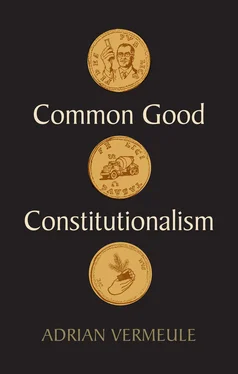A corollary of the nature of determination is that the public authority – including the executive exercising delegated authority – may, without transgressing its boundaries, engage in what I have called “rationally arbitrary decisions.” 27Because determination involves specification within a range in which reason need not yield a unique answer, some element of irreducible judgment will be required. Should the statute of limitations for a given offense be ten years or fifteen? Or perhaps twelve? The law is not so sophomoric as to demand a first-order reason for the choice of one particular number over another, for it is impossible to give any such reason, at least within a reasonable range of choices. In this sense, reason itself allows a certain degree of arbitrary specification, which will thus not be coded as “arbitrary” in the legal sense for purposes of the common good framework.
Libertarians and liberals find the classical tradition appalling or, worse, irrelevant. Both express, along varying lines, the fear that talk of “the common good” is just a shorthand for the preferences of those in power, and worry above all about abuses of power – although libertarians and liberals tend to focus on different abuses, the former worrying mostly about regulatory abuses, the latter about the imposition of public morality that constrains personal expression and elite “experiments in living.” Abuse of power is indeed an evil, and I will have a great deal to say about it in this book. But fear of the common good is mistaken in two ways, institutional and conceptual.
First, we have to take on board the insight of progressives like Dewey that power is always conserved . 28Any claim to “liberty” is a claim for a legal allocation of power to do or not to do or to prevent others from doing or not doing. Hence abuses of power are hardly confined to government actors or the state. Corporations acting under public charters, and nominally “private” actors wielding power under common-law rules of property and contract created and enforced by judges – that is, by a class of government officials – can and frequently do abuse a kind of delegated public power. It is a mistake to focus myopically on direct abuses of power by officials themselves, as opposed to indirect abuses of power made possible by the law.
Second, and more fundamentally, the common good is not “preferences” or “what I like” or “whatever the ruler imposes at whim.” It is not an aggregation of individual goods, as in utilitarianism, let alone the interests of the state apparatus, as in certain forms of “Government House utilitarianism.” 29Rather, as I discuss in Chapter 1, the common good is well-ordered peace, justice, and abundance in political community; the flourishing of the political community is also the greatest temporal good for the individual.
The last part is crucial. Libertarians, usually implicitly, read “the common good” as “the good of the collective” or, even worse, “the good of the state apparatus” and then oppose that to the good of individuals. In a utilitarian variant, they interpret the common good as the aggregate utility of individuals summed up according to some social welfare function, and then oppose this aggregate good to the rights of individuals. None of this gets at the truly common good of happiness in a flourishing political community, which is unitary, capable of being shared without being diminished, and the highest good for individuals as such.
The Common Good and “the Common Good”
In the end, every legitimate act of government works with some conception or other of the common good; that is inescapable. 30This point only becomes all the more transparent when – as often happens, especially in the administrative state – courts are called upon to construe legal provisions and clauses that speak in abstract terms of “the general welfare,” “the public interest,” or other formulations. Such provisions merely make the implicit explicit, writing the common good into the terms of the law itself. Those terms must be construed one way or another. The choices are for the court to give them a substantive construction, which will inevitably require the court to take some view or other of what counts as the public interest, or for the court to defer wholly or partly to political authorities to fill in the provisions’ content, perhaps subject to judicial review for reasonableness.
I will argue that the best of our traditions is that the courts should defer to public determination of such provisions, so long as the public authority acts rationally and with a view to legitimate public purposes: the ends of peace, justice, and abundance, and their modern extensions. Construing the “public use” language of the so-called “Takings Clause” of the Fifth Amendment (incorporated into the Fourteenth), the Court once said that “[t]he ‘public use’ requirement is thus coterminous with the scope of a sovereign’s police powers…. The Court has made clear that it will not substitute its judgment for a legislature’s judgment as to what constitutes a public use unless the use be palpably without reasonable foundation.” 31I argue that this exemplifies a well-ordered scheme of judicial review in our constitutional tradition.
Competitors to the Classical Tradition
As the last point shows, I offer not only a positive account of the common good in public law, but plenty of negative claims as well – critiques of the prominent alternatives. Today, public law and legal theory are dominated by two forces. On the one hand there is progressive constitutional law, which treats the courts as an arena for a liberationist agenda and the law as an instrument for advancing that agenda. On the other hand there is the conservative legal movement, which has largely tied itself to a particular constitutional method, “originalism” – in the version I focus on here, essentially a form of positivism that claims to interpret enacted text according to its original public meaning. 32
Since its modern inception in the 1960s and 1970s, originalism has never been able to free itself from – or even to acknowledge – the implicit normative assumptions and judgments needed to attribute rationality to legal texts, to determine the level of generality at which the meaning of constitutional texts should be read, and otherwise to make sense of their terms. Thus originalism is, in that sense, an illusion; it proves impossible to avoid interpretation that rests on controversial normative judgments at the point of application, especially in hard cases. The consequence is that even putatively originalist decisions of the Supreme Court turn out to be richly interpretive, richly Dworkinian. They are shot through with implicit and explicit justification in light of claims about political morality – including, where appropriate, deference to other institutions based on political role morality.
Because no law can operate without some implicit or explicit vision of the good to which law is ordered, originalism has no natural immunity against infection from without by whatever theory of the good judges and other legal actors interpolate into the law. Unsurprisingly, then, the illusory positivism of the conservative legal movement has largely been hollowed out and taken over by a substantively libertarian constitutional vision – an extremely well-funded libertarian vision. Originalist-libertarians purport to be horrified by purposive rule for the common good even as they defend the role of common-law judges in defining and protecting property rights. They evince hostility to the administrative state, except for the parts of the administrative state that promote the smooth functioning of financial services and the broader economy, and angrily condemn any departures from the putative original understanding, except in areas such as political free speech rights for corporations, gun rights, and “takings” of property rights, in which the law propounded by conservative judges is either expressly or arguably non-originalist. On social matters, originalist judges have written expressly originalist opinions, such as the decision in Bostock v. Clayton County , 33reaching results that almost no one alive at the time of the law’s enactment would conceivably have thought desirable or even defensible. It is a strange originalism indeed that would be unanimously voted down by the enacting generation.
Читать дальше












